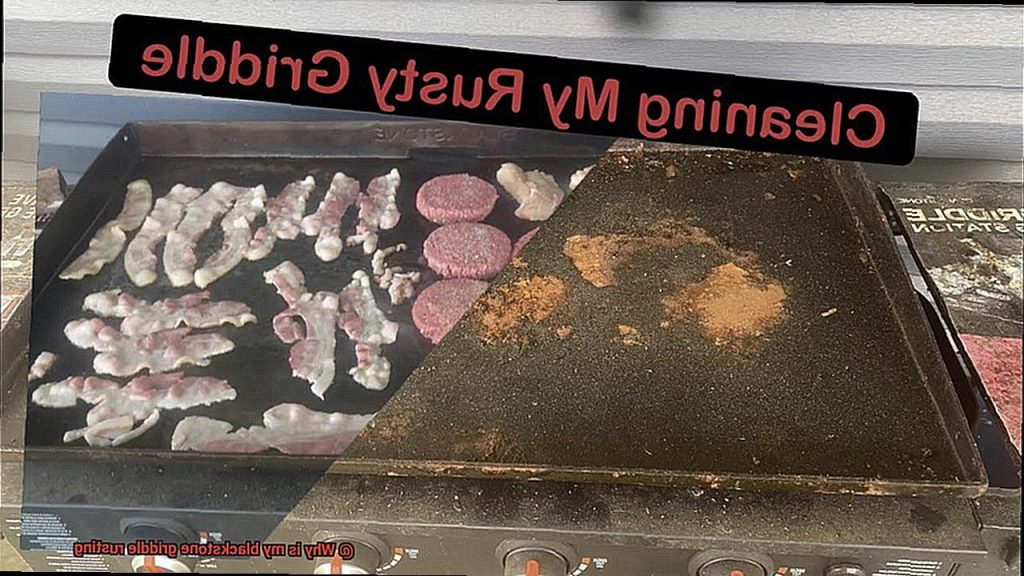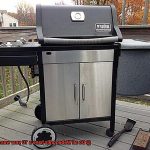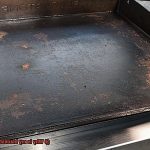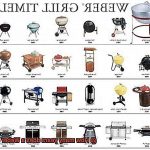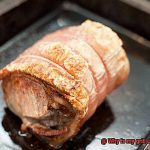Calling all griddle chefs. Are you feeling the heat of frustration because your Blackstone griddle is starting to rust? You’re not alone. Many griddle owners share this predicament and wonder, “Why is my Blackstone griddle rusting?”
The answer isn’t simple, as multiple factors can contribute to rust formation. But typically, moisture or water that comes into contact with the metal surface of the griddle is the culprit. Leaving your griddle uncovered on your patio, exposed to the elements, or not drying it properly after cleaning can lead to rust formation. Also, cooking acidic foods on your griddle can create a chemical reaction that breaks down the protective layer on the metal surface, allowing moisture to seep in and cause rust.
But don’t flip out just yet. There are various effective ways to prevent and treat rust on your Blackstone griddle. From using specific cleaning materials to coating it with protective oil, we’ll be delving into all the essential steps. So if you’re experiencing rust issues on your beloved griddle, keep reading to learn how to keep it looking as shiny and rust-free as the day you bought it.
Contents
Moisture – The Primary Culprit of Rust
Not only does rust look unsightly, but it can also impact the performance of your griddle. While there are several reasons why rust may form on your griddle, moisture is the primary culprit.
Moisture, whether from rain, humidity, or improper cleaning and maintenance, can wreak havoc on your Blackstone griddle. When moisture comes into contact with the metal surface of your griddle, it creates a chemical reaction that leads to rust formation. That’s why it’s essential to keep your griddle dry at all times.
To prevent rust formation, make sure to wipe down your griddle with a dry cloth after each use and remove any leftover food debris. If you wash the griddle with water, ensure that you dry it thoroughly before storing it away. Don’t forget that moisture can collect underneath the cover of your griddle, so always store it in a well-ventilated area.
Living in an area with high humidity or rainfall? Consider investing in a cover for your Blackstone griddle. A cover will protect your griddle from moisture and prevent rust formation.
But moisture isn’t the only factor that can lead to rust formation on your Blackstone griddle. Improper cleaning and maintenance and inadequate seasoning can also contribute to rust formation. Follow the manufacturer’s instructions for cleaning and maintenance and season your griddle regularly to prevent rust from forming.
In summary, to keep rust at bay on your Blackstone griddle, follow these tips:
- Keep your griddle dry at all times
- Wipe down your griddle with a dry cloth after each use
- Store your griddle in a well-ventilated area
- Consider investing in a cover for your griddle
- Follow the manufacturer’s instructions for cleaning and maintenance
- Season your griddle regularly
Improper Cleaning and Maintenance – How to Avoid Rusting
Improper cleaning and maintenance are some of the primary causes of rust formation, but don’t worry – we’ve got you covered with some helpful tips to keep your griddle rust-free.
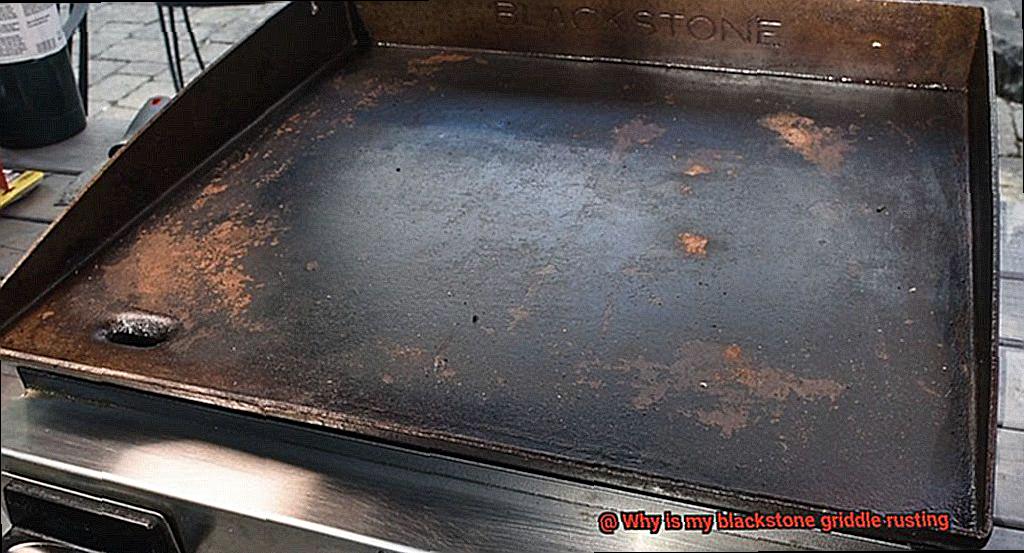
To prevent rusting due to improper cleaning, it’s essential to clean your griddle after every use. Start by scraping off any excess food particles with a spatula, then wipe away any remaining residue with a paper towel or cloth. Be sure to avoid letting any moisture or water sit on the griddle surface as this can also lead to rust formation.
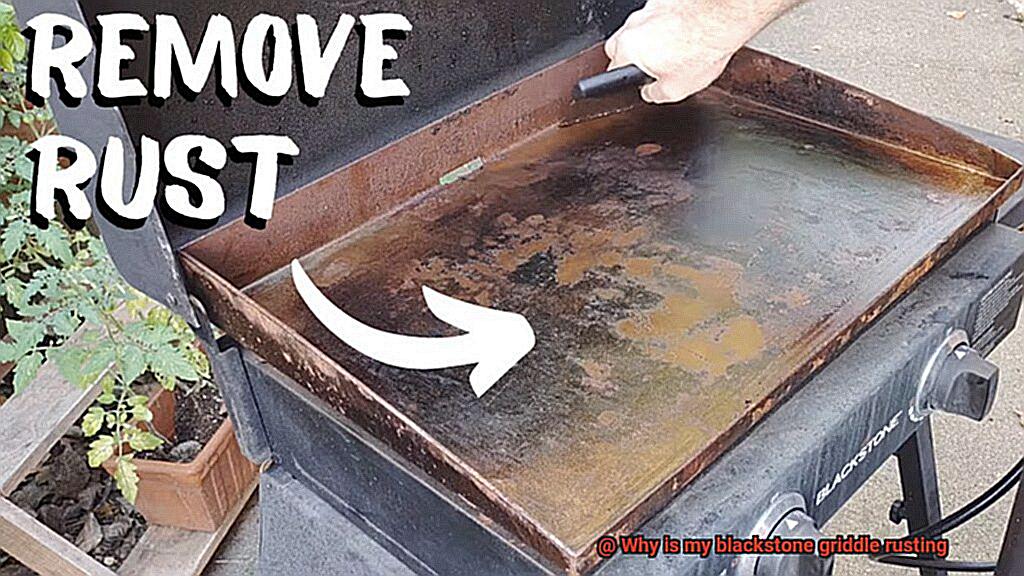
For a deeper clean, use a mild soap solution and warm water to thoroughly clean the griddle surface. However, be careful not to use abrasive cleaners or steel wool as they can scratch the surface and make it more susceptible to rust formation. After cleaning, make sure you dry the surface completely using a dry cloth or paper towel before storing it away.
Regular seasoning is another essential step in maintaining a non-stick surface and preventing rust formation. To season your griddle, apply a thin layer of oil on the surface and heat it until it smokes. This creates a protective layer on the surface that helps prevent rust from forming.
Investing in a cover for your Blackstone griddle is also recommended as it helps protect it from moisture and other elements that can lead to rust formation.
Inadequate Seasoning – A Common Cause of Rust
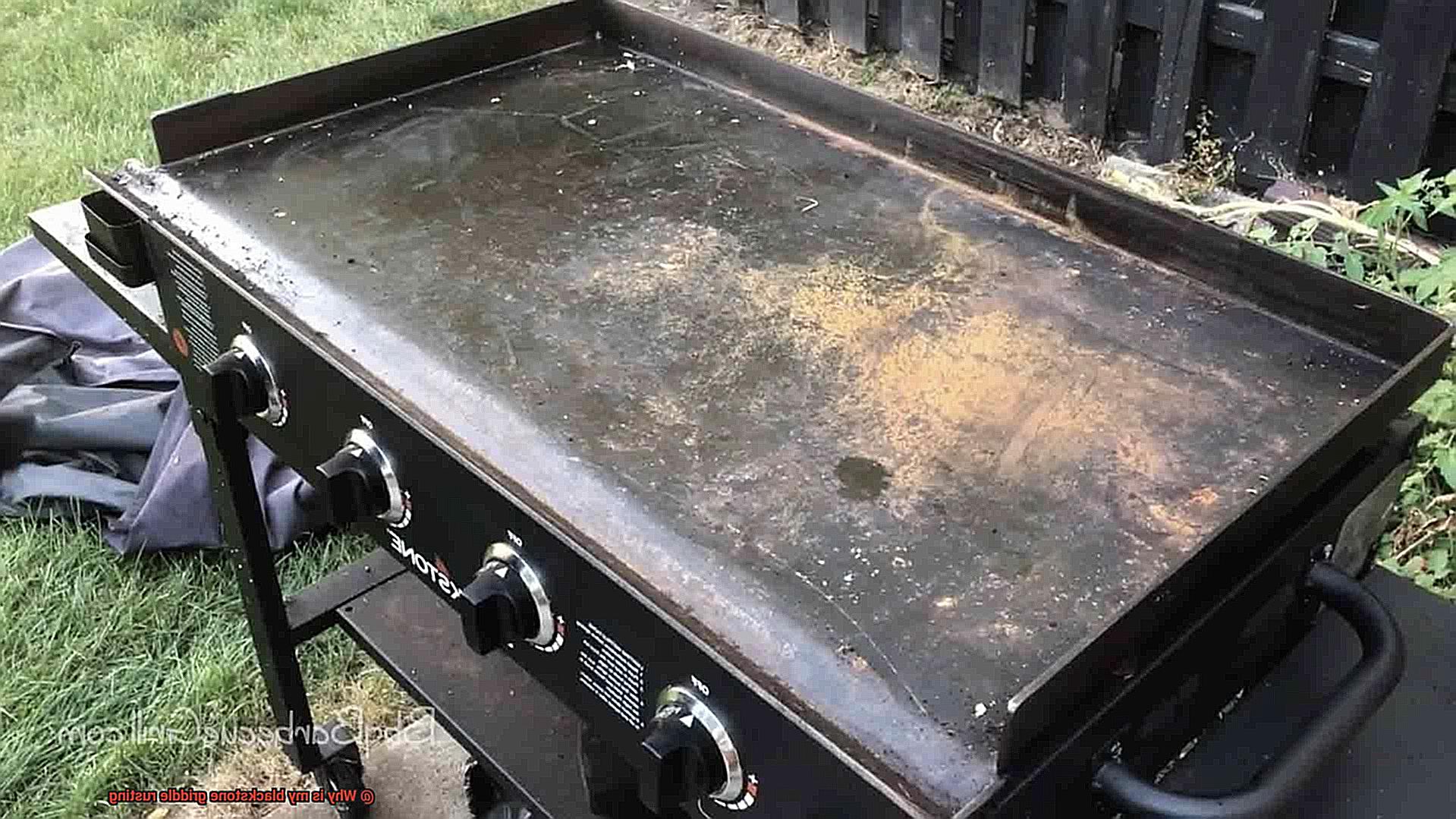
Look no further than inadequate seasoning as a common culprit. Seasoning is the process of applying oil to the surface of the griddle, creating a protective layer that prevents rust and makes the surface non-stick. Without proper seasoning, moisture and air can penetrate the exposed metal surface, leading to rust formation.
To ensure your Blackstone griddle stays rust-free, it’s crucial to properly season it regularly, especially after each use. Begin by cleaning it with soap and water and ensuring it’s completely dry. Then, apply a thin layer of oil such as vegetable or flaxseed oil and spread it evenly across the surface with a paper towel or cloth.
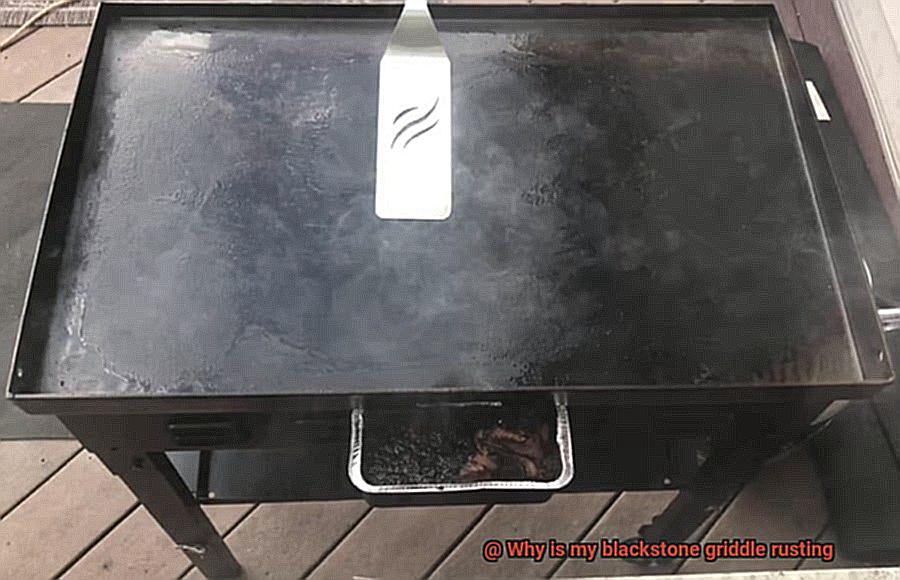
Next, turn up the heat until you see smoke. This is an indication that the oil has polymerized, creating that much-needed protective layer. Remember to repeat this process often for optimal protection.
Harsh cleaning chemicals or abrasive materials should be avoided when cleaning your griddle as they can damage the protective layer, leaving your griddle vulnerable to rust formation. Instead, use a soft sponge or cloth and mild soap to clean your griddle after each use.
Tips for Protecting Your Blackstone Griddle from Moisture
If you’re a passionate outdoor cook, you know how important it is to keep your Blackstone griddle in top condition. Moisture is one of the main culprits that can lead to rust formation on your griddle, but there are several steps you can take to protect it.
Keep it covered
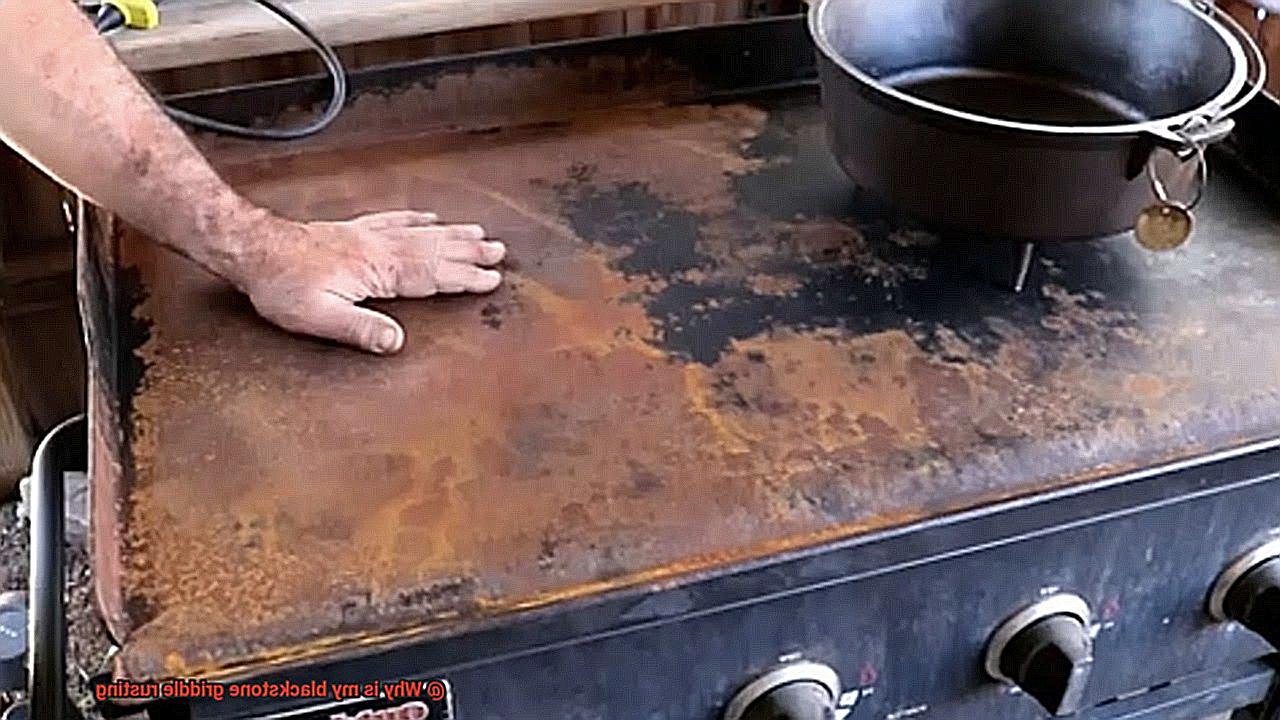
One of the easiest ways to protect your Blackstone griddle from moisture is to keep it covered when it’s not in use. A high-quality cover made from a durable material will shield your griddle from rain, snow, and other forms of precipitation. Look for a snug fit or an adjustable strap system to ensure that it stays firmly in place.
Store it in a dry location
Storing your griddle in a dry location when it’s not in use is another great way to protect it from moisture. Your garage or shed is an ideal spot to keep your griddle safe and dry. You may also want to consider purchasing a storage unit specifically designed for outdoor cooking equipment.
Use a dehumidifier
Another way to prevent moisture from forming on your griddle is to use a dehumidifier in your outdoor kitchen area. This will help reduce the amount of moisture in the air and prevent it from settling on your griddle.
Clean and dry thoroughly
After each use, make sure to clean and dry your griddle thoroughly. Use a scraper or spatula to remove any food debris, then wipe it down with a damp cloth. Once the surface is clean, use a dry towel or paper towel to absorb any remaining moisture.
Apply oil
If you live in an area with high humidity or near the coast, consider applying a coat of oil to your griddle after each use. This will help create a barrier between the metal surface and any moisture in the air. Apply a thin layer of oil using a cloth or paper towel, and wipe off any excess.
Proper seasoning
Proper seasoning is key to protecting your griddle from rust. Seasoning refers to the process of coating your griddle with oil to create a non-stick surface and protect it from rust. Make sure to follow the manufacturer’s instructions for seasoning and re-seasoning your griddle regularly.
Best Practices for Cleaning and Maintaining Your Blackstone Griddle
We have compiled the best practices for cleaning and maintaining your Blackstone griddle.
First things first, after each use, use a scraper to remove any food debris and grease. This simple step will prevent grease buildup and rust formation on the griddle.
Next up, when cleaning the griddle surface, use a mild detergent and warm water to thoroughly clean it. Avoid using harsh chemicals or abrasive scrubbers as they can damage the non-stick coating on the surface of the griddle.
Once you’ve completed cleaning, it’s essential to dry the griddle surface immediately with a clean towel or cloth. Leaving water on the surface can cause rust to form over time, so ensure that you dry it thoroughly.
Now let’s talk about seasoning. Regularly seasoning your Blackstone griddle is crucial for preventing rust formation and improving its non-stick properties. After cleaning, apply a thin layer of oil onto the surface while it’s still warm and let it sit until it cools down.
In summary, here are some best practices for cleaning and maintaining your Blackstone griddle:
- Scrape off food debris and grease after each use.
- Use a mild detergent and warm water to clean the griddle surface.
- Avoid harsh chemicals or abrasive scrubbers when cleaning.
- Dry the griddle surface immediately after cleaning.
- Regularly season your Blackstone griddle to prevent rust formation and improve non-stick properties.
How to Properly Season Your Blackstone Griddle
Properly seasoning your Blackstone griddle is the key to keeping it rust-free and in top condition. Here are five simple steps to help you season your griddle like a pro:
Step 1: Clean Your Griddle
Cleaning your Blackstone griddle before seasoning it is essential. Use hot soapy water and a scrubber to clean the surface, rinse it thoroughly, and dry it completely with a towel.
Step 2: Heat Your Griddle
Turn on your Blackstone griddle and set the heat to high. Let it heat up for about 10-15 minutes until it’s hot enough to cook on.
Step 3: Apply Oil
Using a paper towel or brush, apply a thin layer of oil to the surface of your griddle. You can use any high-temperature oil, such as vegetable oil, canola oil, or flaxseed oil. Spread the oil evenly across the surface of your griddle to create a non-stick layer.
Step 4: Cook the Oil
Let the oil cook on the surface of your griddle for about 15-20 minutes, or until it starts to smoke. This means that the oil has polymerized and formed a protective layer on the surface of the griddle.
Step 5: Repeat
Repeat this process at least two more times to ensure that your Blackstone griddle is properly seasoned. You should also season your griddle every few months or whenever you notice that food is starting to stick to the surface.
It’s important to note that after each use, you should clean your Blackstone griddle with hot water and a scrubber, and then apply a thin layer of oil to maintain its protective layer. This will help prevent rusting and extend the life of your griddle.
Troubleshooting Common Issues with Your Blackstone Griddle
Exposure to moisture is one of the primary reasons for rust formation on your griddle. Moisture can accumulate on the surface of the griddle when it’s left outside or stored in a damp area. This moisture reacts with the metal and causes it to oxidize, ultimately leading to rust formation. To avoid this, ensure that your Blackstone Griddle is always kept dry, especially when not in use. If you’re storing it outside or in a damp area, make sure to cover it with a waterproof cover.
Improper seasoning is another reason why rust forms on your griddle. Seasoning your griddle involves coating it with oil and heating it to a high temperature, creating a non-stick surface and protecting it from rusting. If you do not season your griddle correctly or skip this step altogether, the metal surface can be exposed to air and moisture, leading to rust formation. So, make sure to follow the correct seasoning process by cleaning it first, heating it up, applying oil evenly, and letting the oil cook for 15-20 minutes until it smokes. Repeat this process at least twice more to ensure its longevity and prevent food from sticking.
Lack of maintenance can also contribute to rust formation on your Blackstone Griddle. Cleaning and maintaining your griddle after each use is crucial to remove any food particles or debris that may have accumulated on the surface of the griddle. If left uncleaned, these particles can react with the metal surface and lead to rust formation over time.
thPE2IgnSiI” >
Conclusion
In summary, rust on your Blackstone griddle can be a real headache, but it’s not an uncommon problem. The main culprits behind rust formation are moisture, improper cleaning and maintenance, and inadequate seasoning. But fear not. There are simple steps you can take to prevent rust from forming.
Firstly, keep your griddle dry at all times by wiping it down with a dry cloth after each use and storing it in a well-ventilated area. Additionally, investing in a cover for your griddle can help protect it from moisture.
Proper cleaning and maintenance are also key to preventing rust formation. Use mild soap and warm water to clean your griddle after each use and avoid abrasive scrubbers that could harm the non-stick coating on its surface. Regular seasoning of your Blackstone griddle is also crucial for preventing rust formation while enhancing its non-stick properties.
So, if you’re experiencing rust issues on your beloved Blackstone griddle, don’t panic.

